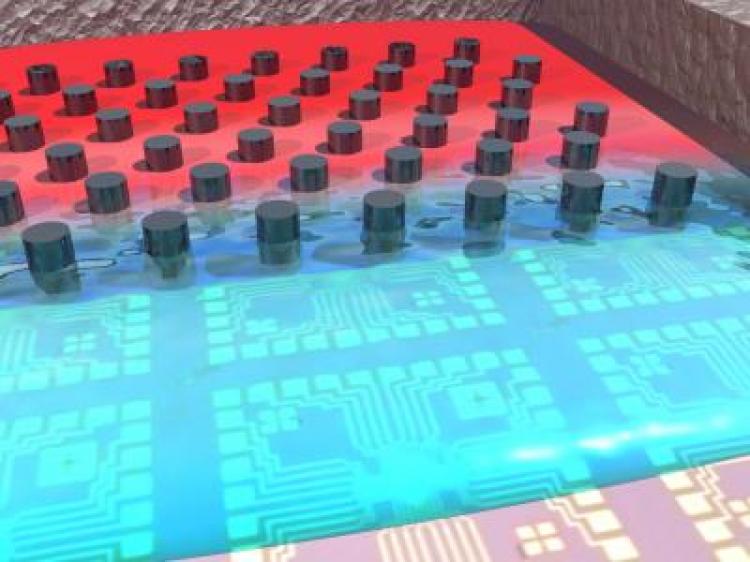Detecting the biological signs of cancer in blood samples could be quicker and more sensitive thanks to new nanotechnology developed by U.S. scientists.
The new process involving nanowire sensors could significantly simplify the way blood is tested for diseases such as cancer and cardiovascular disease. In a study published in Nature Nanotechnology, researchers used nanosensors to detect the biomarkers for prostate and breast cancer.
“Nanosensors have been around for the past decade, but they only worked in controlled, laboratory settings,” said lead researcher Dr. Mark Reed from Yale University in a press release. “This is the first time we’ve been able to use them with whole blood, which is a complicated solution containing proteins and ions and other things that affect detection.”
Current methods for biomarker detection involve separating the plasma from the whole blood sample and then subjecting it to several hours of chemical analysis. The whole process can take several days. In addition, the equipment can only detect biomarkers if they are present in high enough concentrations, and interpretation of the results can be subjective.
The Yale-developed nanosensor can detect the concentration of biomarkers in a matter of minutes and much more precisely, say the researchers.
Biomarkers can include cells, molecules, genes, hormones, or whole system changes that can indicate the risk or presence of a disease. For example, blood cholesterol levels can indicate the risk of cardiovascular disease, or blood pressure the risk of stroke. The presence of certain molecules called antigens in the blood can be used as biomarkers for cancer.
Nanowire-based biomarker detectors have been developed in recent years by other teams of researchers, but the Yale device is the first to be able to isolate biomarkers from whole blood samples.
“Doctors could have these small, portable devices in their offices and get nearly instant readings,” said co-lead researcher Dr. Tarek Fahmy in a press release. “They could also carry them into the field and test patients on site.”
The device works by filtering out specific cancer biomarkers from the whole blood sample and capturing them on a chip. As the molecules accumulate, very small concentrations can be detected—the equivalent of detecting a single grain of salt dissolved in a large swimming pool, said the researchers. Several different biomarkers can be detected at the same time.
As well as being labor and time saving, the new technology may also be a cost-effective tool for disease diagnosis. “The advantage of this technology is that it takes the same effort to make a million devices as it does to make just one,” Reed said.
The new process involving nanowire sensors could significantly simplify the way blood is tested for diseases such as cancer and cardiovascular disease. In a study published in Nature Nanotechnology, researchers used nanosensors to detect the biomarkers for prostate and breast cancer.
“Nanosensors have been around for the past decade, but they only worked in controlled, laboratory settings,” said lead researcher Dr. Mark Reed from Yale University in a press release. “This is the first time we’ve been able to use them with whole blood, which is a complicated solution containing proteins and ions and other things that affect detection.”
Current methods for biomarker detection involve separating the plasma from the whole blood sample and then subjecting it to several hours of chemical analysis. The whole process can take several days. In addition, the equipment can only detect biomarkers if they are present in high enough concentrations, and interpretation of the results can be subjective.
The Yale-developed nanosensor can detect the concentration of biomarkers in a matter of minutes and much more precisely, say the researchers.
Biomarkers can include cells, molecules, genes, hormones, or whole system changes that can indicate the risk or presence of a disease. For example, blood cholesterol levels can indicate the risk of cardiovascular disease, or blood pressure the risk of stroke. The presence of certain molecules called antigens in the blood can be used as biomarkers for cancer.
Nanowire-based biomarker detectors have been developed in recent years by other teams of researchers, but the Yale device is the first to be able to isolate biomarkers from whole blood samples.
“Doctors could have these small, portable devices in their offices and get nearly instant readings,” said co-lead researcher Dr. Tarek Fahmy in a press release. “They could also carry them into the field and test patients on site.”
The device works by filtering out specific cancer biomarkers from the whole blood sample and capturing them on a chip. As the molecules accumulate, very small concentrations can be detected—the equivalent of detecting a single grain of salt dissolved in a large swimming pool, said the researchers. Several different biomarkers can be detected at the same time.
As well as being labor and time saving, the new technology may also be a cost-effective tool for disease diagnosis. “The advantage of this technology is that it takes the same effort to make a million devices as it does to make just one,” Reed said.





